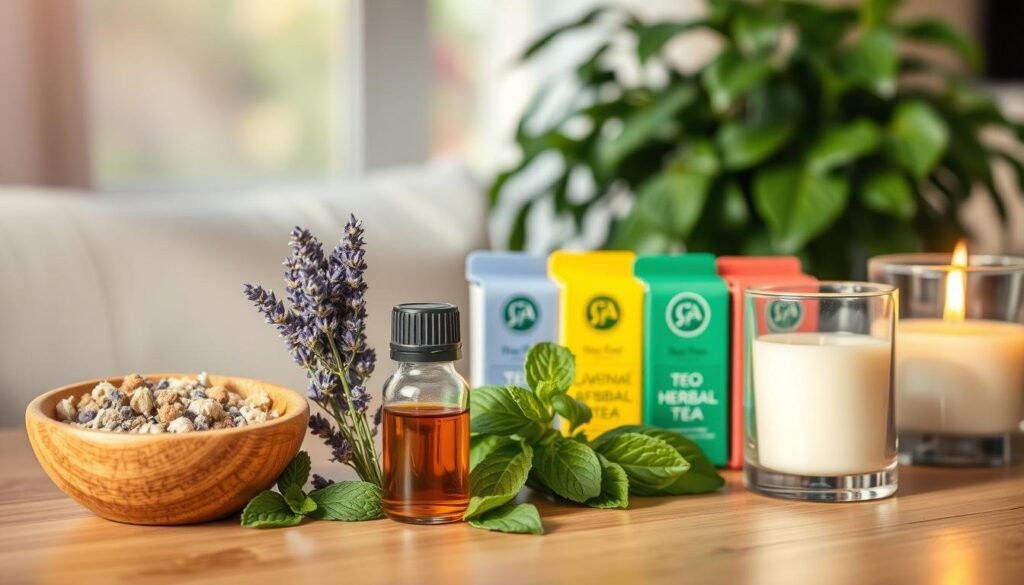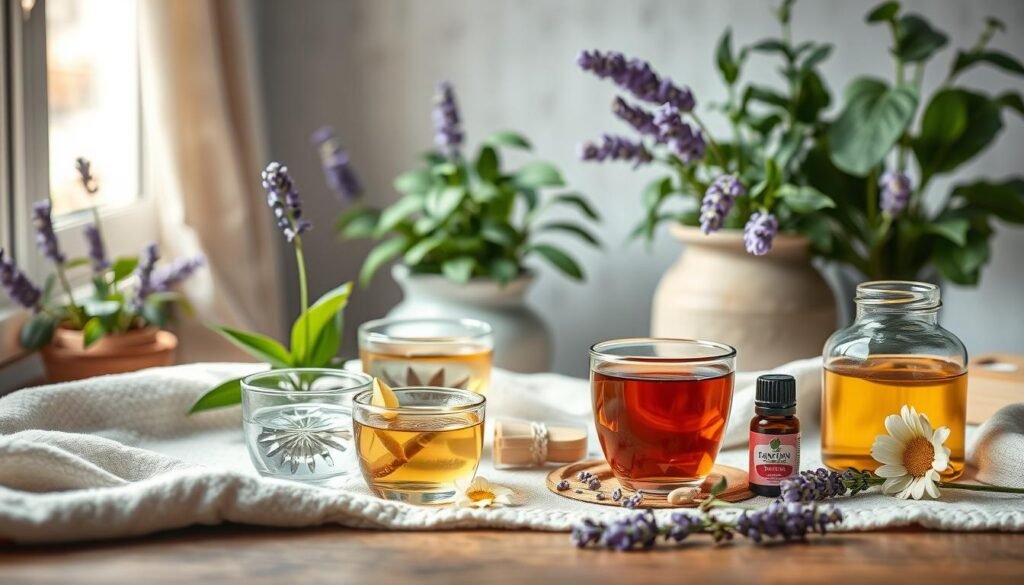Did you know 19% of adults in the U.S. face anxiety disorders annually? This fact points to the need for good ways to handle it. For many, natural OTC remedies for anxiety are a safe and easy choice. They help those looking to add to traditional treatments but are cautious of prescription meds and their side effects.
Herbal anxiety relief and holistic methods are great proactive steps for calming the mind. This article will give readers useful info on understanding anxiety, its symptoms, and various available OTC anti-anxiety remedies. By adding in lifestyle changes, herbal solutions, and alternative therapies, individuals can improve their health and feel better.
Key Takeaways
- Anxiety disorders impact over 19% of adults in the U.S. annually.
- Natural remedies, like chamomile and lavender, show potential in alleviating anxiety symptoms.
- Holistic approaches, including meditation and exercise, can further support mental well-being.
- Consulting a healthcare professional is essential when considering herbal anxiety relief options.
- Over-the-counter anti-anxiety remedies can play a crucial role in an anxiety management plan.
Understanding Anxiety Disorders
Anxiety disorders are a group of mental health issues. They cause constant fear, worry, or nervousness. This can make daily life tough. There are many types, like generalized anxiety disorder, panic disorder, and phobias.
Each type has its own causes and symptoms. Unlike normal anxiety from certain events, these disorders are ongoing and harder to deal with.
More people in the U. S. are getting these disorders. Studies say more folks are trying alternative medicine for help. This shows how crucial finding good anxiety management methods is. Common treatments include therapy and medications like SSRIs and benzodiazepines.
Some herbal remedies might help with mild to moderate anxiety. But, we need more research to be sure they are safe and work well. Learning about anxiety disorders helps people get the right help. It helps them make smart choices about their mental health.
Check out this resource for a deeper understanding of anxiety disorders.
Symptoms of Anxiety
Anxiety affects both body and mind, with up to 31% of adults facing it at some point. Symptoms range from constant worry to physical signs like chest pain. This makes knowing these signs key to seeking help and finding solutions.
Panic attacks bring intense fear and anxiety. Recognizing these signs early can help manage them. Studies show natural remedies, like chamomile extract, can ease Generalized Anxiety Disorder (GAD) symptoms.
Research on 20 studies found acupuncture can lower anxiety, especially in GAD patients. It often works within six weeks, offering quicker relief than some medications. This offers hope for those exploring alternative treatments.
Aromatherapy with citrus essential oils also holds promise. Adding lifestyle changes, like meditation and eating nutritious food, is beneficial. These steps, including vitamin B12 and omega-3s, can reduce anxiety.
By considering these options, people can actively manage their anxiety. Understanding and addressing anxiety helps tailor personal relief methods.
Common Causes of Anxiety
Anxiety comes from many sources. Understanding these can help people know why they feel stressed. Things like genetics and how our brain works are big factors. Personality and past experiences can also make anxiety worse.
Things around us also play a big role in feeling anxious. Stresses from jobs, personal relationships, or big life changes often cause worry. For example, moving or starting a new job can be overwhelming. Knowing these triggers is key to handling them better. This way, people can find ways to lessens their anxiety.
Anxiety disorders include several types, like generalized anxiety, panic disorder, social phobia, and specific fears. Each type has its own triggers and symptoms. For instance, panic disorder leads to sudden, intense fear. Knowing these signs can help in getting the right support early, as this guide explains.
Social anxiety disorder makes socializing really hard. It can make someone avoid people and feel more anxious. Specific fears cause a lot of stress over certain things or situations. Understanding these fears is important in managing anxiety.
Symptoms of anxiety can also come from substance use or stopping use. This shows how what we do affects our mental health. Knowing about these triggers helps in understanding anxiety better. This knowledge leads to better ways to cope with it.
Natural OTC Remedies for Anxiety
Anxiety affects over 40 million people in the U.S. each year. Many are choosing natural remedies to ease their symptoms. These include herbal supplements, aromatherapy, and exercise, which all help in managing anxiety.
Herbal Supplements
Herbs like chamomile and valerian are found to be helpful for anxiety. Magnesium, found in foods like spinach and nuts, helps calm nerves. Omega-3s from fish oil are good for the brain and can reduce anxiety. L-theanine from green tea is also calming. For more info, visit natural remedies for stress and anxiety.
Aromatherapy
Essential oils like lavender offer a natural way to relax. Aromatherapy can be enjoyed through diffusers or applied directly. Research shows it effectively lowers anxiety levels, adding a pleasant touch to stress management.
Exercise and Physical Activity
Exercise is key to reducing anxiety as it boosts mood. Intense workouts are especially good for lowering anxiety. Making exercise a regular part of your day improves both mental and physical health.

| Remedy | Description | Benefits |
|---|---|---|
| Chamomile | An herbal tea known for its soothing properties. | Helps reduce anxiety symptoms and promote relaxation. |
| L-theanine | A compound found in green tea. | Promotes calmness without sedation. |
| Omega-3 Fatty Acids | Essential fats primarily obtained through diet. | Supports brain health and reduces inflammation. |
| Exercise | Physical activity that promotes endorphin release. | Enhances mood and reduces anxiety levels. |
| Aromatherapy | Utilizes essential oils like lavender. | Calming effects and reduction of stress levels. |
Botanical Anxiolytics: A Closer Look
Botanical anxiolytics provide a natural option for anxiety relief. They can make people feel calmer and better overall. Chamomile, lavender, and valerian are three key examples.
Chamomile
Chamomile is celebrated for its calming effects in teas and other products. Studies show it may help lower cortisol, the stress hormone. This could mean less anxiety for some who use it regularly.
Lavender
Lavender is famous for its ability to calm. It’s used in things like aromatherapy and pills. Studies suggest lavender can really help ease anxiety. It’s a soft yet strong way to handle stress.
Valerian
Valerian root isn’t just for sleep issues; it can also ease anxiety. People have had mixed experiences with it. Still, it’s a favored choice for those looking into herbal anxiety relief.
Non-Prescription Anxiety Treatments
Non-prescription anxiety treatments offer relief without meds. They include lifestyle changes to boost mental health.
Herbal supplements like FGO Organic Chamomile Tea are popular for relaxation, with over 116,000 Amazon reviews. French Lavender Organic Essential Oil from Eden Botanicals provides aromatherapy for under $20.
Regular physical activity helps manage anxiety. A 2018 review shows high-intensity workouts are especially good. Eating foods rich in omega-3s and vitamins is also beneficial.
Techniques like deep breathing and mindfulness help reduce anxiety. The Calm app, with over 100 million downloads, offers great tools for relaxation.

Acupuncture and mindfulness activities, like those from the Buddha Board Art Set, promote calm. These methods are part of a holistic mental health approach. They show how various strategies work together to improve well-being.
| Treatment Type | Example/Product | Benefits |
|---|---|---|
| Herbal Supplement | FGO Organic Chamomile Tea Bags | Promotes relaxation, aids sleep |
| Aromatherapy | French Lavender Organic Essential Oil | Reduces anxiety through scent |
| Physical Activity | Aerobic Exercise | Helps alleviate anxiety symptoms significantly |
| Mindfulness Activity | Buddha Board Art Set | Encourages relaxation and creativity |
| App | Calm App | Guides users in mindfulness and stress relief |
Alternative Therapies for Anxiety Disorders
Anxiety disorders touch the lives of many adults in the U.S. About 40 million people face anxiety today. Looking into alternative treatments is key to better handling it. These methods can support standard treatments, bringing relief and better emotional control.
Meditation and Mindfulness
Meditation is becoming well-known for easing anxiety. It helps people deal with overwhelming thoughts and lessens anxiety’s physical effects. Studies show meditation can change the brain and body. This leads to less anxiety and better sleep. Meditation brings peace and balance to one’s emotions.
Deep Breathing Techniques
Breathing exercises are easy and work well for relaxation. Deep breaths counter the quick, shallow ones seen in anxiety attacks. This invites calmness and helps regain composure in stressful moments. Doing these exercises often prepares someone to better handle stress.
Time Management Strategies
Managing time well can cut down on anxiety. Organizing tasks and setting priorities can combat feeling swamped. Techniques like making to-do lists and setting up deadlines help. They make big tasks seem smaller and more doable. This control over one’s schedule brings down anxiety. It leads to a more balanced life, which is good for mental health.
| Therapy Type | Benefits | Common Practices |
|---|---|---|
| Meditation and Mindfulness | Reduces anxiety, improves emotional regulation | Mindfulness meditation, guided imagery |
| Deep Breathing Techniques | Promotes calmness, controls breathing patterns | Diaphragmatic breathing, 4-7-8 technique |
| Time Management Strategies | Alleviates stress, enhances productivity | Task prioritization, scheduling, creating to-do lists |
Holistic Anxiety Management Approaches
Holistic anxiety management looks at the whole person, not just symptoms. It suggests journaling and animal therapy as effective methods.
Journaling as Therapy
Journaling lets people express their thoughts and feelings. This leads to emotional release. It’s key for understanding what triggers anxiety.
Keeping a journal helps people reflect on their experiences and see patterns. It can bring clarity. It also helps with finding ways to deal with anxiety.
Time Spent with Animals
Therapy with animals provides emotional support and friendship. It helps lessen anxiety. Being with pets increases oxytocin and lowers cortisol, the stress hormone.
This makes people feel calmer. It’s good for mental health. Having a pet or doing animal-assisted therapy makes a big difference emotionally.

| Approach | Benefits | How to Incorporate |
|---|---|---|
| Journaling | Emotional clarity, self-reflection, stress relief | Set aside time daily; reflect on feelings and experiences |
| Therapy with Animals | Reduces stress, provides companionship, boosts mood | Spend time with pets, consider animal-assisted therapy programs |
Over-the-Counter Anti-Anxiety Remedies
Many people today struggle with anxiety. They often use over-the-counter remedies to ease their symptoms. These options are easy to get and can be a first step before getting professional advice.
The Role of CBD Oil
CBD oil has become a popular choice for easing anxiety. You can find it in drugstores and health shops. It helps by working with the body’s natural systems. While many find it helpful, studies are still checking how well it works.
Aromatherapy Oils Available at Drugstores
You can also find help with aromatherapy oils at drugstores. These oils, like lavender and citrus, help calm you down. Using them can make your surroundings peaceful and ease your mind.
Conclusion
Natural OTC remedies and alternative therapies provide relief for anxiety. These options are vital as many suffer from anxiety disorders. Knowledge about anxiety and effective management strategies is key.
Using holistic treatments like herbal supplements and lifestyle changes helps in managing anxiety. This proactive approach is beneficial.
Combining natural remedies, such as magnesium and ashwagandha, with SSRIs offers a comprehensive mental health strategy. This mix boosts the effectiveness of standard treatments. It builds confidence in managing anxiety.
Recent studies show few seek professional help for anxiety. Utilizing accessible remedies and practices empowers individuals. Natural remedies and holistic approaches like mindfulness and yoga improve well-being. To learn more about herbal supplements and anxiety, check out this study on herbal supplement usage.